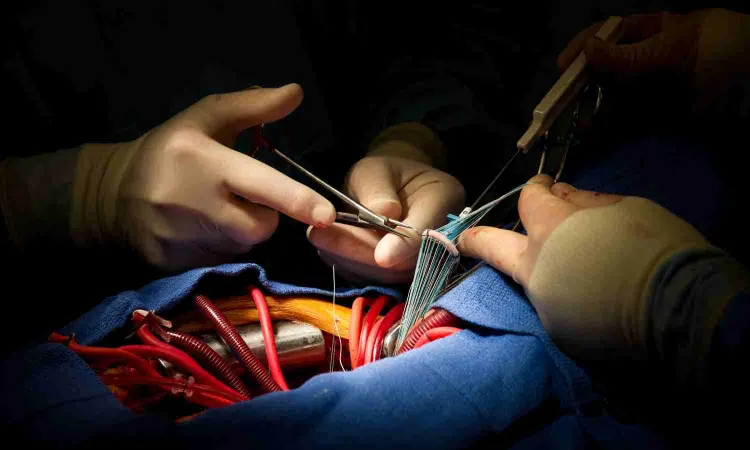- Home
- Medical news & Guidelines
- Anesthesiology
- Cardiology and CTVS
- Critical Care
- Dentistry
- Dermatology
- Diabetes and Endocrinology
- ENT
- Gastroenterology
- Medicine
- Nephrology
- Neurology
- Obstretics-Gynaecology
- Oncology
- Ophthalmology
- Orthopaedics
- Pediatrics-Neonatology
- Psychiatry
- Pulmonology
- Radiology
- Surgery
- Urology
- Laboratory Medicine
- Diet
- Nursing
- Paramedical
- Physiotherapy
- Health news
- Fact Check
- Bone Health Fact Check
- Brain Health Fact Check
- Cancer Related Fact Check
- Child Care Fact Check
- Dental and oral health fact check
- Diabetes and metabolic health fact check
- Diet and Nutrition Fact Check
- Eye and ENT Care Fact Check
- Fitness fact check
- Gut health fact check
- Heart health fact check
- Kidney health fact check
- Medical education fact check
- Men's health fact check
- Respiratory fact check
- Skin and hair care fact check
- Vaccine and Immunization fact check
- Women's health fact check
- AYUSH
- State News
- Andaman and Nicobar Islands
- Andhra Pradesh
- Arunachal Pradesh
- Assam
- Bihar
- Chandigarh
- Chattisgarh
- Dadra and Nagar Haveli
- Daman and Diu
- Delhi
- Goa
- Gujarat
- Haryana
- Himachal Pradesh
- Jammu & Kashmir
- Jharkhand
- Karnataka
- Kerala
- Ladakh
- Lakshadweep
- Madhya Pradesh
- Maharashtra
- Manipur
- Meghalaya
- Mizoram
- Nagaland
- Odisha
- Puducherry
- Punjab
- Rajasthan
- Sikkim
- Tamil Nadu
- Telangana
- Tripura
- Uttar Pradesh
- Uttrakhand
- West Bengal
- Medical Education
- Industry
Embolic protection device shows no effect on stroke risk with TAVR: Study

A device designed to remove embolic material-fragments of tissue that can be released into the bloodstream during transcatheter aortic valve replacement (TAVR)—did not result in a reduction in the rate of stroke, according to a randomized trial presented at the American College of Cardiology’s Annual Scientific Session (ACC.25).
The BHF PROTECT-TAVI trial is the largest randomized trial assessing the use of a cerebral embolic protection device during TAVR, also known as transcatheter aortic valve implantation or TAVI.
“This large, well-conducted, appropriately powered clinical trial has addressed the question of whether the SENTINEL Cerebral Protection System is effective in an unselected cohort of TAVI patients,” said Rajesh Kharbanda, MD, associate professor of cardiovascular medicine at the University of Oxford, United Kingdom, and the study’s first author. “In our population, a routine strategy of cerebral embolic protection did not reduce the rate of stroke. Our study provides convincing evidence that there is no value in the routine use of this device during TAVI.”
TAVR is a common procedure carried out to treat patients with aortic stenosis, a condition in which the aortic valve becomes narrowed, preventing blood from flowing properly. During TAVR a prosthetic valve is implanted in the diseased valve between the aorta and the heart’s left ventricle. While TAVR carries a good safety record overall, around 2% to 4% of patients have a stroke during or shortly after the procedure, sometimes because calcium or tissue fragments are released when the replacement valve is deployed. About half of such strokes result in permanent disabilities.
Cerebral embolic protection devices are designed to capture embolic material that enters the bloodstream during TAVR, preventing it from reaching the brain and causing a stroke. SENTINEL, the device used in the trial, is the most frequently used embolic protection device in TAVR procedures.
The BHF PROTECT-TAVI trial enrolled 7,635 patients undergoing TAVR for aortic stenosis at 33 centers in the United Kingdom between 2020-2024, representing about 30% of all UK patients who received the procedure in those years. Participants had an average age of 81 years and just under 40% were female. Participants were randomized 1:1 to undergo TAVR with the SENTINEL device or TAVR without cerebral embolic protection.
In a third planned interim analysis, the trial’s primary endpoint-the incidence of stroke at 72 hours post-TAVR or at the time of hospital discharge, if sooner-occurred in 2.1% of patients assigned to the SENTINEL device and in 2.2% of patients assigned to the control group, showing no evidence of a difference between the two study arms. Results for secondary endpoints including all-cause mortality, stroke severity, disabling stroke and cognitive outcomes were also similar between groups. Recruitment for the trial was stopped after the interim analysis based on these findings.
No differences in outcomes were seen in any subgroups that were analyzed.
Researchers said the stroke risk associated with TAVR has decreased over the past decade due to improvements in TAVR devices, implantation techniques and procedural protocols and as operators have become more experienced with the procedure. Although the trial showed current cerebral embolic protection devices do not improve outcomes, Kharbanda said it is possible that next-generation embolic protection devices could potentially reduce stroke risk for certain groups, but further trials would be needed to demonstrate this.
“We need to understand which patients are at higher risk of stroke during TAVR and whether a more stratified approach to delivering therapy to those people is beneficial,” Kharbanda said.
Although the study was limited to the UK, researchers said the broad, national rollout of the trial and its representative patient population likely make the results generalizable to other countries.
Reference:
Embolic protection device shows no effect on stroke risk with TAVR, American College of Cardiology, Meeting: American College of Cardiology's Annual Scientific Session.
Dr Kamal Kant Kohli-MBBS, DTCD- a chest specialist with more than 30 years of practice and a flair for writing clinical articles, Dr Kamal Kant Kohli joined Medical Dialogues as a Chief Editor of Medical News. Besides writing articles, as an editor, he proofreads and verifies all the medical content published on Medical Dialogues including those coming from journals, studies,medical conferences,guidelines etc. Email: drkohli@medicaldialogues.in. Contact no. 011-43720751


